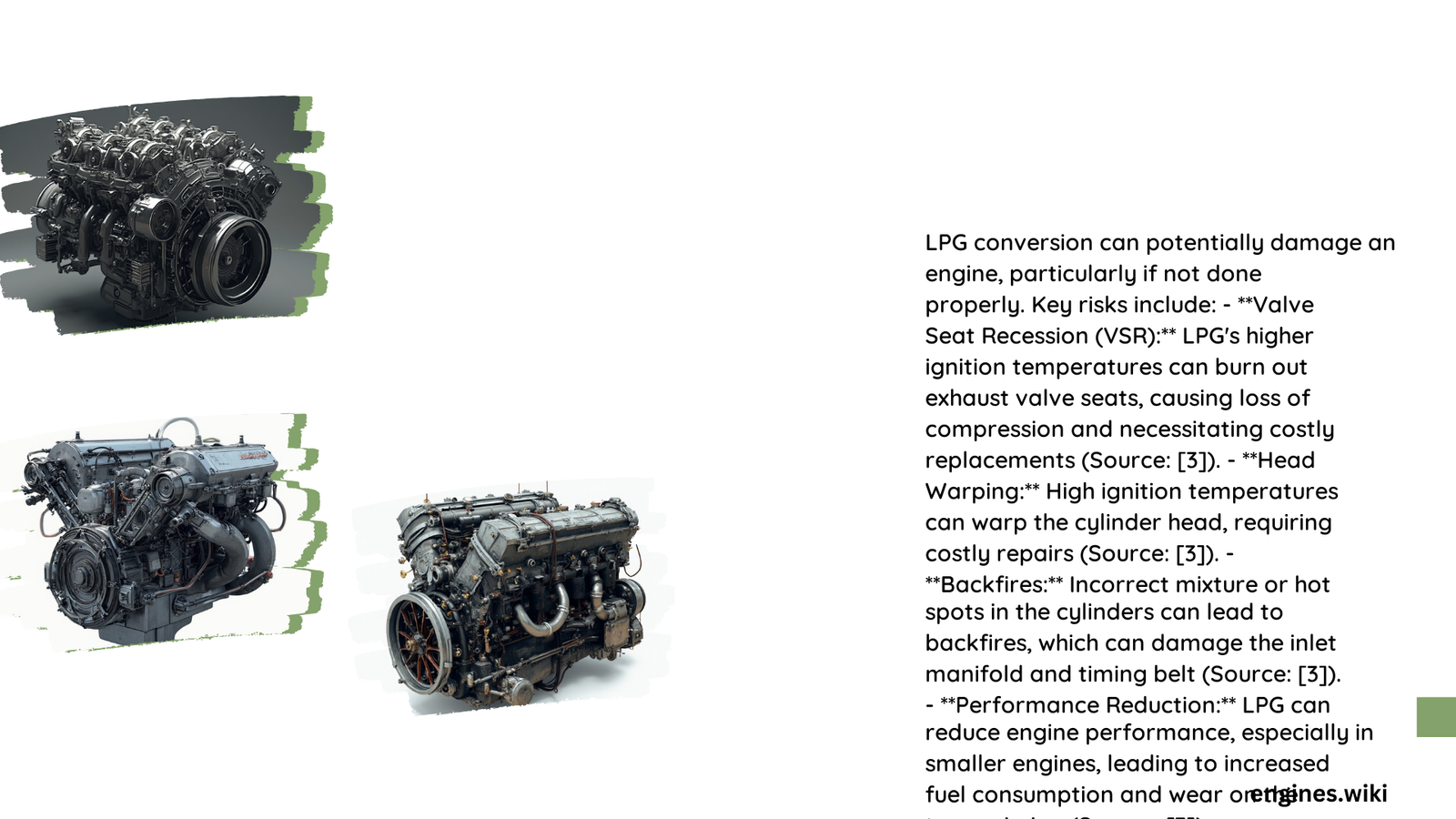LPG conversion can potentially impact engine performance and longevity, but the extent of damage depends on various factors. While LPG burns cleaner than petrol, it can accelerate valve wear and reduce engine power. Proper installation and maintenance are crucial to minimize negative effects. This article explores the specific impacts of LPG conversion on engine components, performance metrics, and long-term reliability.
What Are the Specific Mechanical Impacts of LPG Conversion on Engine Components?
How Does LPG Conversion Affect Valve Wear?
LPG combustion generates higher temperatures, which can accelerate valve and valve seat wear. This is particularly problematic in engines not designed for LPG, leading to Valve Seat Recession (VSR). VSR can cause:
- Loss of compression
- Reduced engine power
- Increased fuel consumption
The cost to replace valve seats and valves can range from $1500 to $2500.
What Impact Does LPG Have on Piston Rings and Cylinder Walls?
LPG’s effects on piston rings and cylinder walls are mixed:
- Pros:
- Burns more cleanly than petrol
- Doesn’t cause bore wash or gas blowby
-
Reduces carbon deposits and engine knocks
-
Cons:
- Provides less lubrication in the combustion chamber
Despite the reduced lubrication, LPG doesn’t necessarily lead to increased wear on piston rings and cylinder walls. In fact, its cleaner combustion may potentially extend the engine’s lifespan.
How Does LPG Conversion Impact Engine Performance Metrics?

What Changes Can Be Expected in Horsepower and Torque?
Converting a car to LPG typically results in a reduction in engine power:
| Power Reduction | Percentage |
|---|---|
| Typical Range | 5% – 10% |
| Extreme Cases | Up to 20% |
This reduction is more noticeable during high-performance driving, such as:
– On open roads
– When ascending hills
How Does LPG Conversion Affect Fuel Efficiency?
LPG conversion’s impact on fuel efficiency is complex:
-
Cost Savings: LPG offers significant fuel cost savings due to its lower price per unit of energy compared to petrol.
-
Consumption Variability: Actual fuel efficiency may vary, and the engine may consume more fuel when worked harder to compensate for power loss.
-
Engine Size Factor: Larger engines tend to mask the performance drop better than smaller engines.
What Are the Recommended Maintenance Practices for LPG Fuel Systems?
How Often Should LPG Systems Be Maintained and at What Cost?
LPG-converted cars require more frequent and specialized maintenance:
- Regular checks of:
- LPG tank
- Pipes
-
Connectors
-
Servicing of:
- Vaporizer
- Fuel injectors
Maintenance costs can be higher due to:
1. Specialized nature of the work
2. Need for certified LPG conversion specialists
What Specific Procedures Are Involved in LPG System Maintenance?
Regular inspections should focus on:
- LPG Tank and Components:
-
Check for leaks in tank, hoses, and seals
-
Vaporizer:
-
Service to ensure proper conversion of liquid LPG to gas
-
Fuel Injectors:
-
Clean and verify proper functioning
-
Ignition System:
- Monitor spark plugs, coils, and ignition wires
- Faults in these components can significantly impact LPG system operation
What Are the Long-term Effects of LPG Conversion on Engine Longevity?
How Does LPG Conversion Compare to Petrol in Terms of Engine Lifespan?
The long-term effects of LPG conversion on engine longevity are debated:
Positive Aspects:
– Cleaner combustion may reduce wear and tear
– Potential to extend engine lifespan by reducing carbon deposits
Concerns:
– Long-term reliability issues, especially with improper conversion or maintenance
– Soft valve seats may be more susceptible to damage
Important Considerations:
1. No clear empirical data on average lifespan comparisons
2. Avoid converting cars with soft valve seats
3. Ensure proper maintenance and calibration of the LPG system
In conclusion, while LPG conversion can offer benefits such as reduced fuel costs and cleaner combustion, it also presents potential risks to engine components and performance. Proper installation, regular maintenance, and consideration of the specific engine design are crucial factors in minimizing potential damage and maximizing the benefits of LPG conversion.
